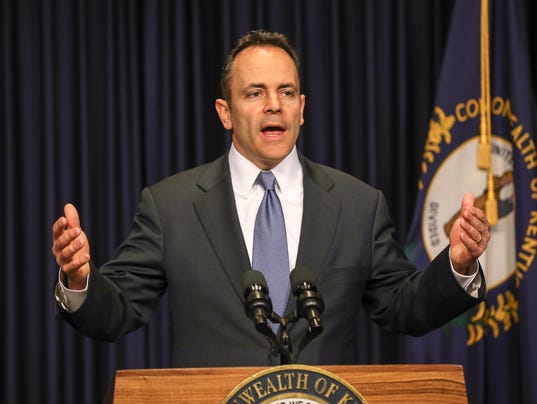by Joseph Gerth, @Joe_Gerth –

(Photo: By Michael Clevenger, The Courier-Journal)
Gov. Matt Bevin has vetoed four bills and struck two line items from the fifth as the 2016 General Assembly winds to a close on Friday.
It’s the most any active Kentucky governor has wielded the veto pen since then-Gov. Paul Patton vetoed 10 bills and one resolution in their entirety and used the line-item veto on one spending bill in 2000.
Among those vetoed is House Bill 423, the state revenue bill that in large part would have cost the state general fund nearly $40 million. Most of that cost would have been the result of shifting coal severance taxes back to the counties that generate them, and about $10 million would come from targeted tax cuts for things like medicine for farm animals and tax breaks for parents who contribute to college savings funds for their children.
In his veto statement, Bevin said he rejected the bill because he believes such legislation should be dealt with in a comprehensive tax reform package.
“Given the overall financial condition of the Commonwealth and its massive unfunded pension liabilities, now is not the time to pass additional tax expenditures, however meritorious each provision may be,” he wrote.
Jason Bailey, the executive director of the Kentucky Center for Economic Policy, said his group normally has opposed piecemeal changes to the tax code, but had not taken a position on HB 423 because it didn’t believe the tax cuts were terribly large. However, he said the group has traditionally believed that tax cuts for college savings accounts benefit the wealthy and don’t help the poor.
But Katie Gabhart, executive director of the state Executive Branch Ethics Commission, said the veto could make it harder for her agency to help root out corruption in state government.
The agency maintains financial disclosure forms of public officials and investigates allegations of ethical breeches by any of the 32,000 employees who are covered by executive branch ethics laws.
The measure included a provision that would have increased the fee from $125 to $275 paid by companies that employ lobbyists. Gabhart said the increase was needed for the small agency to avoid slashing its staff. The agency has four full-time and two part-time employees and has a budget of $534,000. Because of cuts Bevin ordered in the last three months of the fiscal year, the agency is facing more than a $20,000 deficit.
That deficit was expected to double in the next fiscal year with Bevin’s proposed 9 percent budget cuts. The governor originally proposed to raise the lobbyist fees to $199. Even with the lobbyist fee increase to $199 per year, that deficit rises to nearly $40,000 next year.
It would more than double if the agency doesn’t receive any increased fees.
Gabhart said her agency would have to cut employees saying that the commission has already slashed everywhere it could in cutbacks during the Beshear administration.
“We don’t use state vehicles,” she said. “We don’t travel out of state. We have nothing else to cut.”
One person happy with a veto, however, was Chief Justice John D. Minton Jr., after Bevin used line-item vetoes to strike clauses in House Bill 306 that would cut the judicial budget as well as require the agency to give raises to employees, which Minton has said it couldn’t afford.
“I am grateful to Gov. Bevin for recognizing the Judicial Branch needs this additional funding to avoid major disruptions to court operations,” he wrote in an email to judicial branch employees.
Bevin also vetoed Senate Bill 153, which would have set new guidelines for judges when ordering child support.
Sen. Whitney Westerfield, R-Hopkinsville, said the guidelines haven’t been changed in decades. Among other things, the guidelines would have increased the amounts many people must pay in child support, but in some cases would have absolved any child support payments when there is a wide disparity in earnings.
Judges have authority to deviate from the guidelines and do that now.
In his veto statement, Bevin said he agrees with increasing payments by higher-earning parents,. He said he disagrees with the provision that “would provide for the first time, an option for parents to have zero financial responsibility for the raising of their children.”
Westerfield said he doubts the Senate will seek to override the veto but added, “I wish he didn’t veto it.”
Bevin also vetoed Senate Bill 22, which would have required assisted living centers to educate residents about the need for flu vaccines. The bill did not require the assisted living centers to provide such flu shots.
In his veto message, Bevin called the measure “an example of unnecessary government intrusion into the private sector.”
Sen. Ralph Alvarado, R-Winchester, a doctor who sponsored the measure, didn’t return a phone call.
Senate Bill 196 also fell victim to the veto. It would have created a “Books for Brains” program that would have provided books for preschool students. The cost of the program to the state was expected to be $50,000 annually once it got up and running. Bevin vetoed it saying the bill would create administrative costs for the state Department of Libraries and Archives.
Sen. Stan Humphries, R-Cadiz, said the program is based on one in Trigg County in which every child under the age of five who signs up is mailed one book per month. Most of the cost is paid for with donations and grants, Humphries said.
Humphries said he probably would not ask to override the veto but said he would push for the program in future sessions of the General Assembly.
Joseph Gerth can be reached at (502) 582-4702. His email address is [email protected].
